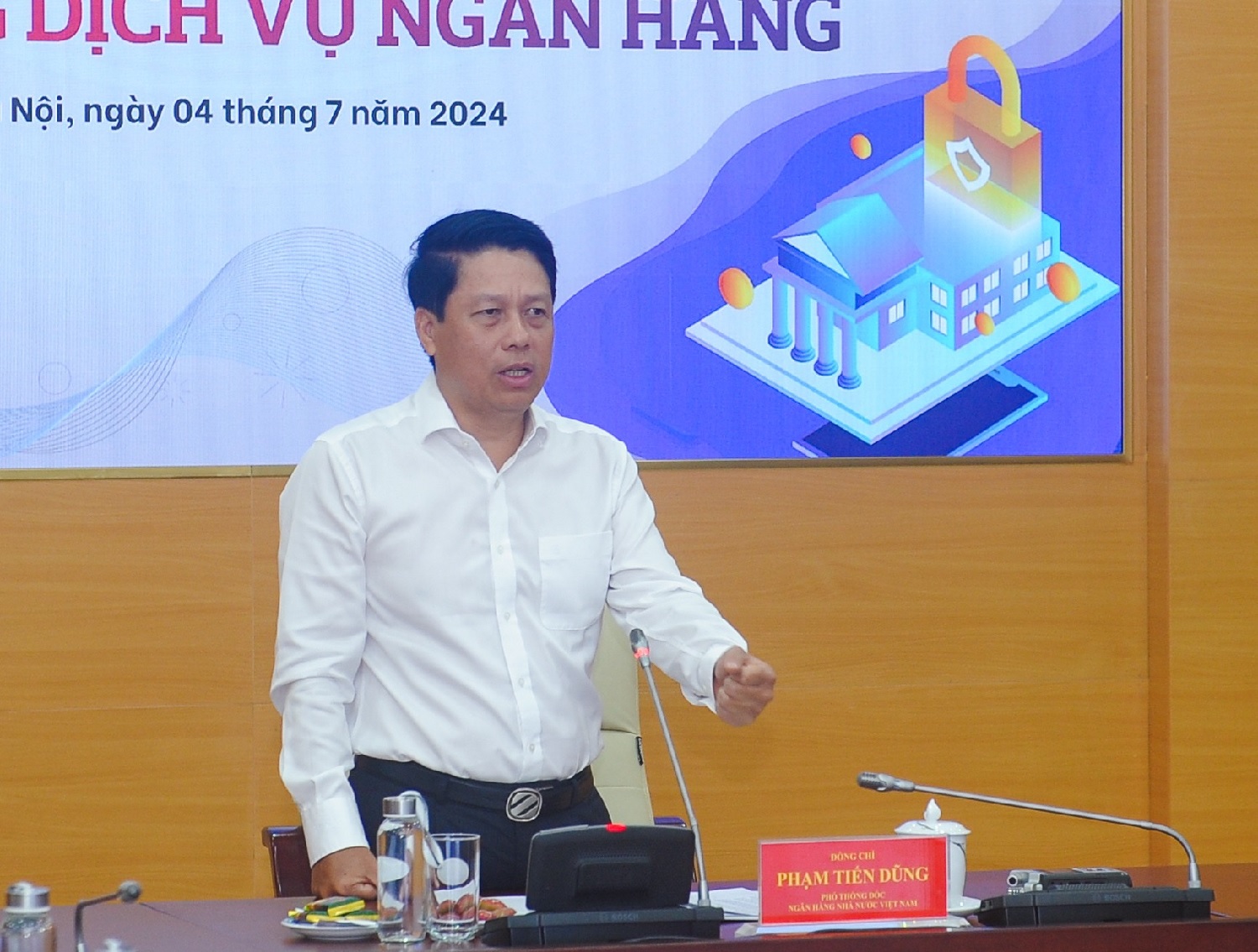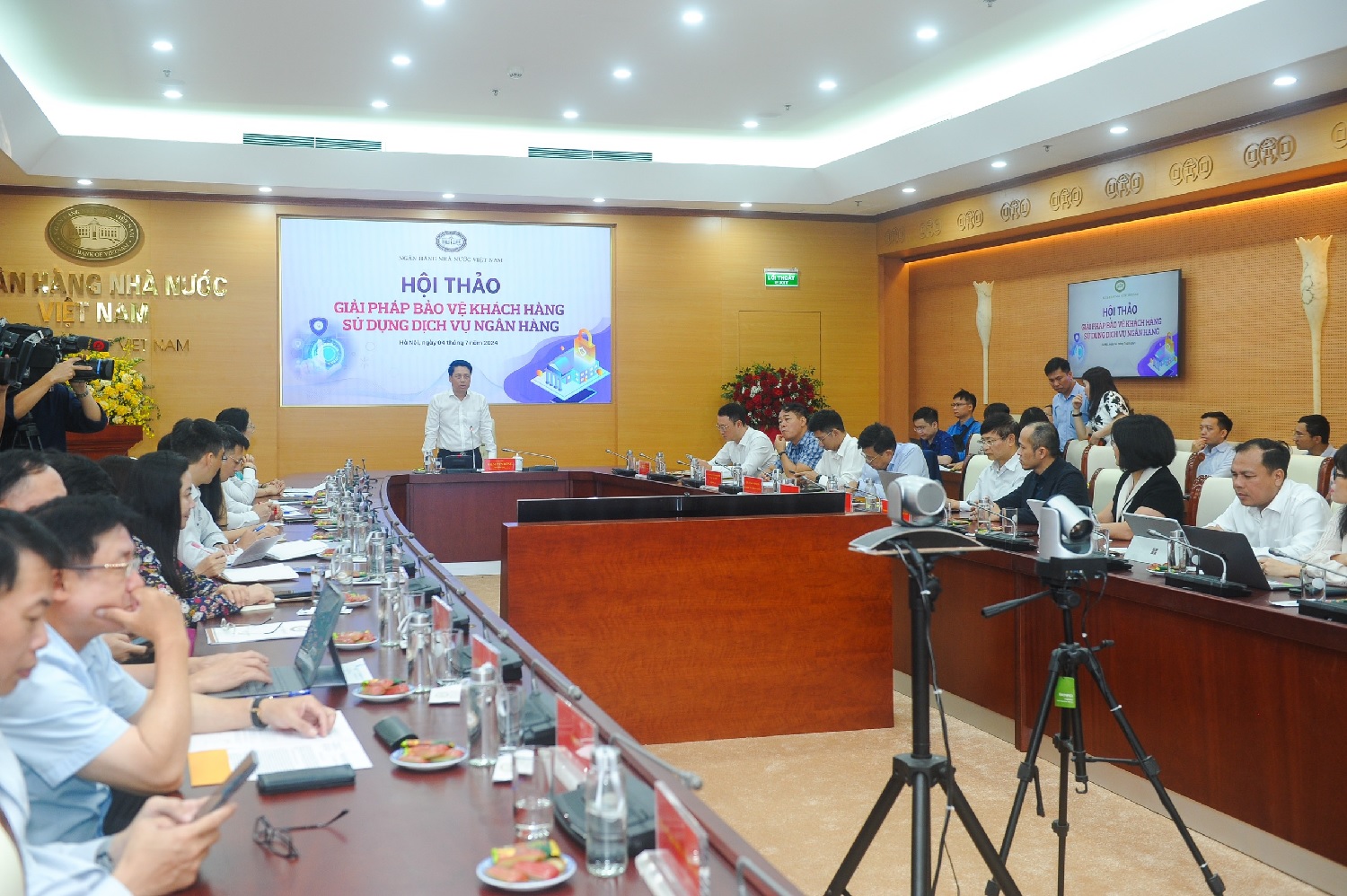Over 87% of adultsshave bank accounts

Deputy Governor Pham Tien Dzung commenced the workshop by highlighting that under the Government's direction, the banking sector has made unwavering efforts and closely coordinated with relevant ministries and agencies in the digital transformation process and achieved remarkable results across several important pillars: shifting public perception, refining institutional framework, upgrading infrastructure, implementing data exploitation techniques, and developing digital banking models, along with applying security and safety measures etc.
Currently, over 87% of adults in Vietnam hold bank accounts, and over 95% of transactions at many banks are processed through digital channels. Cashless payments have gained considerable growth, particularly in mobile payments and QR code transactions, which have seen an average annual growth rate exceeding 100% in the period 2017-2023.
Banking institutions are continuously investing in, upgrading, and developing their technological infrastructure to ensure uninterrupted, secure, and smooth operation. The interbank electronic payment system processes an average daily amount of VND 830 trillion (equivalent to USD 40 billion). The financial switching and electronic clearing system handles an average of 20-25 million transactions per day. New digital technologies and achievements of the 4th Industrial Revolution are also strongly applied to serve the need of developing new products and services and meet the increasingly high demand of people and businesses.
Furthermore, the banking sector has closely coordinated with the Ministry of Public Security in crime prevention. Notably, tasks under Project 06/QD-TTg (Approval of the Project on developing population data applications, identification and electronic authentication to serve national digital transformation in the period 2022-2025, vision to 2030) have been effectively implemented. This project utilizes population data for data cleaning and accurate identification/authentication of customer information, supports consumer lending activities on electronic channels and electronic guarantees, as well as contributing to ensuring the safety of banking operations.
However, besides the benefits, online banking products and services also expose the banking sector to risks and challenges related to security, safety and confidentiality. These include cyberattacks, the use of high technology for fraud activities targeting customer funds and bank accounts through sophisticated and complex methods.
Efforts of the banking sector
In recent years, the banking sector has proactively implemented key solutions to mitigate and minimize security and safety risks associated with online banking activities, including: Policy and regulatory framework enhancement; Technological solutions and collaborative mechanisms; Public awareness about fraud prevention; and Coordination with relevant agencies in combating online frauds.
The SBV has established and continuously improved the legal framework governing cybersecurity and payment activities. Currently, the SBV is focusing on finalizing guiding documents that ensure synchronized implementation with the 2024 Law on Credit Institutions and Decree No. 52/2024/ND-CP on cashless payment. Additionally, efforts have been made to replace, amend, and supplement existing Circulars on security and safety standards for online banking services. Decree No. 52 aims to establish a robust legal basis for cashless payment activities, promote its adoption, facilitate business operations, and introduce a diverse range of secure, convenient, and cost-effective payment products and services.

Notably, on December 18, 2023, the SBV Governor issued Decision No. 2345/QD-NHNN on the implementation of security and safety solutions for online payment and bank card payment (Decision 2345), effective from July 1, 2024.
As stipulated by Decision 2345, from July 1, 2024, electronic transactions exceeds VND 10 million for individuals or a total daily payment value over VND 20 million must now apply one of the available biometric authentication measures.
The implementation of this Decision secures online payment transactions by ensuring they are conducted solely by the account holder. This enhances the security, safety, and confidentiality of online payment transactions, minimizes the risk of fraud and scams, as well as prevents the rental, borrowing, buying and selling of payment accounts and e-wallets used for illegal purposes.
This is also one of the solutions that contributes to protecting bank customers. According to bank statistics, after 3 days of implementation (from July 1, 2024), transactions have been basically smooth.
On June 28, 2024, the SBV Governor signed and issued Circular No. 17/2024/TT-NHNN regulating the opening and use of payment accounts at payment service providers (Circular 17), replacing the altered and supplemented Circular 23/2014/TT-NHNN. The issuance of Circular aims to guide the opening and use of payment accounts in accordance with the regulations outlined in Decree No. 52/2024/ND-CP. It is more consistent with current legal documents, while also revising a number of regulations to meet practical requirements. The Circular includes additional regulations on ensuring security and confidentiality in the opening and use of payment accounts, which stipulates the responsibility of banks and foreign bank branches to establish risk management and control procedures throughout the payment accounts opening and usage process.
Besides the development of enhanced mechanism, policies, legal frameworks, and investment in modern technological infrastructure and confidentiality measures taken by credit institutions to protect bank clients, financial education and communication also play a critical role. role. In recent years, the banking sector's communication activities have been constantly innovated with diverse contents and expression formats, application of modern technology to broaden outreach and ensure the contents are understood, memorable and easily implementable for the general public. The SBV has been collaborating with Vietnam Television to produce financial education programs such as “Smart Money” and “Wise Money” within the “Good morning” program, as well as the “Holding The Purse Strings” program. The SBV also coordinates with relevant agencies to implement the annual “Cashless Day” event, organizes yearly Digital Transformation Day activity and coordinates with schools to organize “Understanding Money Correctly” and “Financial Literacy” competitions for students etc. Notably, the SBV has established a strong presence on social network platforms with a verified Financial Education Fanpage (https://www.facebook.com/Giaoductaichinh.official) dedicated to introducing financial products and services, including cashless payment options. The Fanpage also serves to raise awareness of cybercrime threats and provides instructions on how to utilize banking services with a particular focus on security skills in cashless payment and more generally, in banking services delivered through digital platforms. This approach aligns with the modern communication trends adopted by central banks around the world.
Financial education programs and communication initiatives have enhanced public awareness and equipped individuals with necessary skills to access and use banking products and services, contributing to fostering cashless payment and the realization of the National Strategy for Financial Inclusion's goals.
Solutions to strengthen the security of banking services on the cyberspace
Deputy Governor Pham Tien Dzung outlined the SBV's key priorities for the future, emphasizing its commitment to strengthening security, safety, and confidentiality within the online banking landscape, thereby protecting the interests of financial and bank customers. These priorities include:
Firstly, the SBV will continue to research, develop, and promulgate timely regulatory documents, circulars, and amendments to existing regulations regarding online banking security etc.; effectively implement Decision No. 2345/QD-NHNN to fortify security and confidentiality in both payment transactions and the broader spectrum of online banking services.
Secondly, the SBV will continue to invest in and improve the information technology infrastructure of credit institutions and payment intermediaries; upgrade and develop payment infrastructure to ensure uninterrupted, secure, and interconnected operations that seamlessly integrate with other sectors (such as public services, healthcare, education, e-commerce etc.) and facilitate cross-border payment to effectively address the growing demand for banking services of businesses and individuals within the economy.
Thirdly, the SBV will maintain its collaboration with the Ministry of Public Security on Project 06, which focuses on utilizing chip-embedded ID and VneID accounts to facilitate accurate customer identification and verification; supporting the secure and convenient provision of banking products and services, while simultaneously mitigating risks and criminal activities that seek to exploit payment services for fraud purposes.
Fourthly, the SBV is committed to fortifying information security in banking and payment sectors; cooperating with relevant units to bolster preventive measures, investigation and handling of high-tech crimes; preserving the legitimate rights and interests of customers, etc.
Fifthly, the SBV will continue to promote financial education and communication to improve the public’s financial literacy and skills. This will be conducted through innovative and diverse expressive formats, while embracing the potential of 4.0 technology and modern media platforms, targeting individuals in rural and remote areas, youth and students etc.
Research and International Cooperation Department (translation)

























